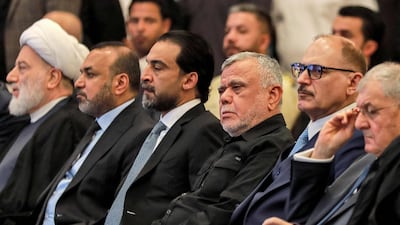Iraq's Parliament is scheduled to vote for a new Speaker on Saturday after a six-month impasse among Sunni political factions over the choice of candidate for the post.
Under the country's post-Saddam Hussein power-sharing system, meant to avoid more sectarian conflict, the post of Speaker is held by a Sunni Arab, the President is Kurdish and the Prime Minister a Shiite Arab. However, disputes between ethnic blocs often delay appointments to these posts.
The Parliament re-elected Mohammed Al Halbousi for a second term as Speaker in January 2022, months after a general election, but he was dismissed by the Federal Supreme Court in November last year after facing charges of forgery.
Mr Al Halbousi, a former governor of Anbar province, founded the Progress Party, or Taqadum in Arabic, which won the majority of Sunni votes in the elections in October 2021 to take 37 of the 329 seats.
However, a rift among Iraq's Sunni blocs has delayed the election of his replacement. No candidate was able to obtain a majority during a vote in January.
Taqadum nominated Shaalan Al Karim for the post but the Sunni Sovereignty bloc’s candidate, Salem Al Issawi, received the highest number of votes in the first round of polling. A second round was scrapped as disputes led to walkouts that lowered the quorum below the two-thirds threshold needed to hold the vote.
Taqadum has voiced its support for veteran politician Mahmoud Al Mashhadani after the Co-ordination Framework, the largest bloc in Parliament, called on the Sunni blocs to fill the position within a week.
Mr Al Mashhadani previously held the post from 2006 to 2008, when he was forced to resign after being accused of "rude behaviour" towards other officials.
"In the grand scheme of things, whether the vote passes or doesn't, it represents some of the political challenges that Iraq continues to face," Renad Mansour, a senior Iraqi research fellow at London's Chatham House, told The National.
"There has been an attempt in general to split the Sunnis. Under Mr Al Halbousi there was an attempt to consolidate Sunni power, however, rival groups led by former prime minister Nouri Al Maliki have sought to take that away from him," Mr Mansour said.
Mr Al Mashhadani, who is known to have close ties with Mr Al Maliki, a powerful Shiite politician, is "loyal to some parts of the Sunnis but not others", Mr Mansour added.
"So the kind of divide-and-conquer factor is very much at play here."
Sajad Jiyad, a political analyst in Baghdad, said the vote would most probably go in favour of Mr Al Mashhadani but the most important issue was for Parliament to meet the two-thirds quorum.
"I think it's very likely we'll just have a Speaker elected in the first round and probably won't even go to the second round," Mr Jiyad told The National. "I think Mr Al Mashhadani has the strongest position at this moment.
"Behind the scenes there's always bargaining and, you know, some threats. I'm sure some people are not completely happy with the choice."
This would put pressure on some politicians not to show up, he added, raising doubts there will be the quorum required for a vote.


